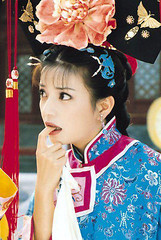13 o'clock
Those of us that learn Mandarin according to the Beijing standard typically learn the expression 二百五 pretty early. While it seems to be the innocent number “250,” it actually has a slang meaning: “stupid” or “idiot.”
Those of us spending time in China’s south eventually come to a realization: you don’t hear 二百五 that much around here. What you do hear, especially in Shanghai, is 十三点 (“13 o’clock”). While it means basically the same thing as the north’s 二百五, it’s milder, often approaching something more like “silly” or “dopey” (in Chinese, 傻得可爱, or “cutely silly”).
Interestingly, Baidu Zhidao even gives us a poster child for the 十三点 look: a character once played by actress Zhao Wei (赵薇).
Baidu tells us that when it’s used between two people of the opposite sex, it’s often used in flirting (and most often comes out of the girl’s mouth).
As for origins of the expression, Baidu Zhidao gives us two main theories:
1. It’s a reference to an illegal move in a gambling game (6 and 7 can’t be played at the same time, and they add up to 13)
2. It’s a reference to an hour that traditional clocks do not strike (no military time back then!)
I thought 十三点 might be a fun thing to put on a shirt (more fun than “250” anyway), so I made this new one. I think it’s the kind of thing that laowai would enjoy wearing to see what kind of reaction it gets out of the Chinese, whereas the Chinese can’t fathom why a foreigner would possibly want to wear a shirt with that on it. (Good times all around!)
The Sinosplice shop has other conversation-starting Chinese-themed t-shirts.



Another theory I heard:
It implies 13 strokes of the character 痴 and 傻.
How would you use those words in a sentences. Are they nouns or adjectives? Could I say 你是二百五 or 你怎么这么二百五? I learned Mandarin in Fuzhou, and never heard either 二百五 or 十三点. That of course doesn’t necessarily mean they don’t say them. They do have a phrase in Fuzhou hua however that (translated into Mandarin) is 傻没吃, in other words “so stupid you can’t eat,” but it’s only said in the dialect. I’d imagine there are all kinds of idioms like this all over the Middle Kingdom, and a lot probably come from dialects. Do you have any idea if 十三点 is said in Shanghai hua?
I’ve never heard this one (of course, I’m in Shenzhen, which might explain it). If someone had said that to me, I’d probably think I was hearing things wrong and would require a beer or two.
I’ve had multiple Shanghainese friends explain it to me as the “thirteenth nipple” on a pig….as in the most a pig has in a litter is about 12 piglets, and if the sow has 13 nipples then the 13th is “useless”
@ Matt,
Yeah, it’s said in SH. Actually, I never knew what it was in Mandarin, but just learned it as a Shanghainese way to 骂人。 It sounds something like, “Nong zi say a tee”.
Oops,
I meant @ Ben.
Personal experience? 😉
The T-shirt is too subtle to me, I wouldn’t have connected the dots. Personally, I think it would be a shock to the system for Chinese to see someone wearing a T-shirt reads “属狗”. Or better yet, to see a couple wearing matching T-shirts, the guy’s reads “老不死的”,the lady’s reads“老婆子”。
One of the bad things about learning Beijing Mandarin is the cultural blandness it covers everything with. They teach you expressions that only work in Beijing, because Beijing is the center of the country, and heck, those people out in the sticks are just hicks with no culture, right?
@Ben – In Shangainese it’s prounounced “si say di”. si is shi, say is san, di is dian.
Ben,
I won’t speak for 二百五, because as I mentioned, it’s just not used much around here, so I’m not as familiar with it.
As for 十三点, I hear 你怎么这么十三点 the most. It can be abbreviated to 十三 too. Just Google/Baidu it for online usage examples.
Often used or not, from what a shanghainese friend tells me it’s not that polite…? Actually she says it wouldn’t be far from calling a girl “bitch” and that it’s really not a nice thing to say. That just sounds a little different from “mild” and “cute”… Did anybody else make that experience? Maybe she’s just an exception (haha).